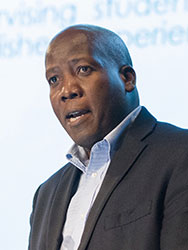The power of multigenerational mentorship at Makerere University in Uganda: Q and A with Dr Mark Kaddumukasa
May / June 2018 | Volume 17, Number 3

Mark Kaddumukasa, M.D. Ph.D.
Dr. Mark Kaddumukasa is a senior lecturer at the college of health sciences at
Makerere University in Uganda, and a physician at Mulago Hospital in Kampala, the largest public hospital in the East African country. A former Fogarty trainee, Kaddumukasa’s research focus is on neurological disorders. With support from Fogarty through the five-year Emerging Global Leader Award and from NIH’s National Institute for Neurological Disorders and Stroke (NINDS), Kaddumukasa in 2017 began a project studying strategies to address stigma and improve the quality of life of people living with epilepsy in Uganda.
How has Fogarty training helped your career?
With Fogarty support, I’ve trained as a clinical researcher, supervised student projects, enriched my skills and learned new research and clinical techniques. I have had the opportunity to network with U.S. collaborators, including some who eventually became my mentors. I was able to come to the U.S. and spend about a month at Johns Hopkins University where I underwent bioethics training. This enabled me to supervise the research of others and become a member of the Internal Review Board (IRB) at Makerere University. Last, but not least, Fogarty gave me the opportunity to visit NIH and see how research is conducted there. It was an eye-opener - completely different to the way we do research in Africa.
Which training program particularly impacted you?
I would have to say the Fogarty
Medical Education Partnership Initiative (MEPI) project, on which I was a co-investigator, affected me the most. Through MEPI, we trained medical residents in neurology research. Students wrote proposals, which were evaluated and scored by a committee made up of experienced international and local researchers, with the best proposals earning support for their project. I supervised three or four students each year, including two Ph.D. candidates. Their projects were focused on things like stroke, epilepsy, dementias and peripheral neuropathy in patients at Mulago Hospital in Kampala.
While I was supervising these students, I was continuing to learn from my own mentors - Professors Eli Katabira and Martha Sajatovic from Case Western Reserve University, and Professor
Nelson Sewankambo from Makerere. They taught me things that you can only learn by working with a mentor - what expectations to set yourself, how to make presentations, write a manuscript, how to review a research proposal and more. Probably the most important lesson I learned from working on this project is that mentorship is not something you learn by studying a textbook. You learn it by doing it, and Fogarty facilitates that.
What is your current research focus?
I have an
Emerging Global Leader K-award, which is supported by Fogarty and NIH’s National Institute for Neurological Disorders and Stroke (NINDS). I’m studying the stigma surrounding epilepsy and the quality of life of epileptic people in Uganda.
Why did you choose to focus on this?
I decided to pursue this line of research after I saw someone suffering from epilepsy who was locked up in their house, tied to their bed, while the family watched as the individual had seizures. I was deeply disturbed by what I saw. We have affordable drugs in Uganda that work, but the family thought that the medications wouldn’t do anything.
This is an example of how misinformation about epilepsy is accepted as fact by many in Africa. There is also a widespread belief in parts of the continent that epilepsy is caused by spirits or witchcraft - which is, of course, not true. I think the most important thing we can do to address the stigma surrounding epilepsy is to educate people, especially the caregivers of people with the condition. I’m working with faculty at Makerere and Case Western Reserve University to achieve that.
How did Makerere become a research powerhouse?
Makerere found itself on the brink of collapse in the 1970s and ‘80s. Since then, we have rebuilt and reinvented ourselves to get to where we are today - one of the top five African universities. I think multigenerational mentorship, which is supported by Fogarty and other international partners, has been key to our rebirth. Makerere now has an established senior clinical research team who mentor the next generation, who in turn pass on what they learn to the next generation, and so on. Our international partners have helped us build foundations in research and helped us to get many successful projects off the ground and take them through to completion.
More Information
To view Adobe PDF files,
download current, free accessible plug-ins from Adobe's website.